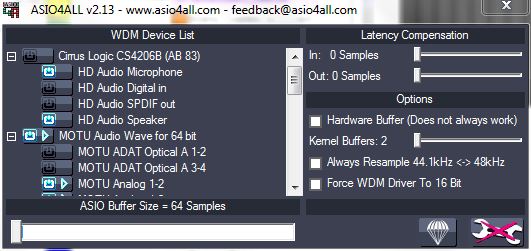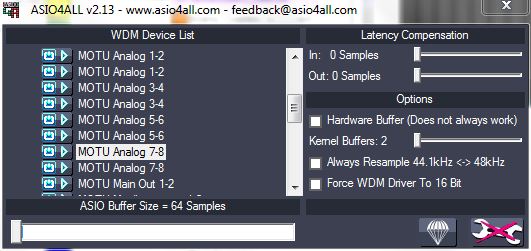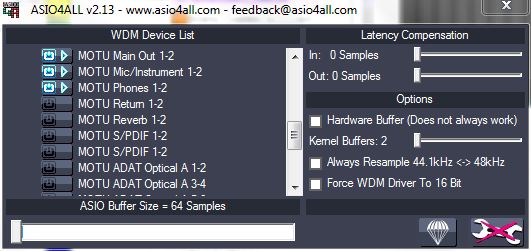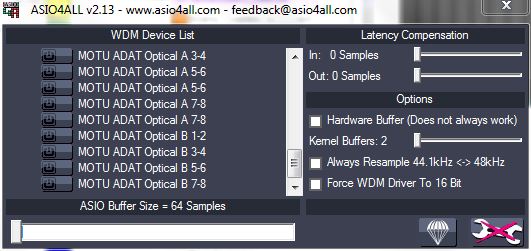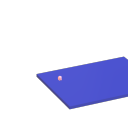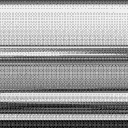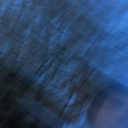[sigmund~] creation arguments/parameters setup
@cfry Those sorts of sounds can be gotten as well and a more sensitive mic will pick them up. The problem you are having is the mic is just getting noise, everything of the same volume, so nothing distinct for [sigmund~] to pick out, remember all those discrete sources add together. By wind noise I meant the sound of wind hitting a microphone directly, this creates a constant sound which will over power all those other sounds, not the sound of wind rustling the leaves in a tree. A good wind screen will be very helpful for you here, but you need to remember, a windscreen does reduce mic sensitivity, so there is a trade off, increase mic sensitivity and the more wind noise it picks up, put on a denser wind screen and you loose some of that sensitivity. A pop screen could work better since it can be placed between the wind and the mic, the other sides of the mic are left open, but if the wind shifts you could end up with wind noise overpowering everything and have to reposition the screen. If you limit yourself to days with nothing more than light winds, you should be able to get by with just a light windscreen and not suffer much loss in sensitivity.
My knowledge of windscreens and pop screens and the like is fairly limited and largely theoretical, I have little hands on use of these things as I mostly record in more controlled environments or in situations where I have more leeway than your needs allow. Seeking out people or sites dedicated to making field recordings would likely be your best path on finding a good mic/pre setup for your needs.
data structures - xy-pad in value range 0-1
@ingox said:
.... now the parentheses come into play: Instead of actually using the given coordinates x0 and y0, Pd arranges each point relative to the value range given in parenthesis:
The first x0 can move between 0 and 240 on the x axis and between 0 and 240 on the y axis. The second x0 can move between 0 and 240 on the x axis and is therefor placed at the same height as the first one.
But the second one can be moved between 10 and 250 on the y axis and is therefor placed below the first one (counting from top on the y axis, if i recall correctly).
.....
hey again! i'm still having problems to understand, how these boundaris exactly work. let's have a look at your example:
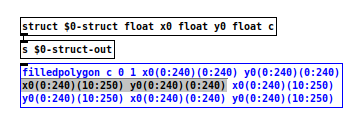
the first pair of coordinates seem clear so far. the second pair describes the point below the first one, if i got you correctly. so the x0 variable can move between 0-240 on x-axis and 10-250 on y axis, which is 10 point below the first one.
BUT... why do the boundaries of the y0-variable differ from those of x0? they do describe the same vector, so i presumed, the'd also need to be bound to (0:240)(10:250). the next coordinate pairs are equally obscure to me....  let's look at the third pair, which i guess, is the point to th right from the second one. why is x0 bound between 0 an 240 on the x-axis? shouldn't it be bound to (10:250), as it should have a 10 pixel offset to the other points? sorry for my silly questions, but this is really confusing to me...
let's look at the third pair, which i guess, is the point to th right from the second one. why is x0 bound between 0 an 240 on the x-axis? shouldn't it be bound to (10:250), as it should have a 10 pixel offset to the other points? sorry for my silly questions, but this is really confusing to me...
PD's scheduler, timing, control-rate, audio-rate, block-size, (sub)sample accuracy,
@EEight said:
@lacuna said:
I just see this flag on linux:
-nosleep -- spin, don't sleep (may lower latency on multi-CPUs)
Oh yes and there are startup flags for loading a different scheduler (I corrected this in my first post now)
https://puredata.info/docs/faq/commandline
-rt or -realtime -- use real-time priority
-nrt -- don't use real-time priority
-sleep -- sleep when idle, don't spin (true by default)
-nosleep -- spin, don't sleep (may lower latency on multi-CPUs)
-schedlib <file> -- plug in external scheduler
-extraflags <s> -- string argument to send schedlib
-batch -- run off-line as a batch process
-nobatch -- run interactively (true by default)
Not sure, would be interested to know too.
@EEight output of full text search of sleep with grep in pd's source folder -nri flags set:
https://pastebin.com/3mBw6Mnj
/pd-0.50-2.src.tar.gz.extracted/pd-0.50-2/src/u_pdsend.c:86: sleep (nretry < 5 ? 1 : 5);
/pd-0.50-2.src.tar.gz.extracted/pd-0.50-2/src/s_stuff.h:65:extern int sys_sleepgrain;
/pd-0.50-2.src.tar.gz.extracted/pd-0.50-2/src/s_stuff.h:163:EXTERN void sys_microsleep(int microsec);
/pd-0.50-2.src.tar.gz.extracted/pd-0.50-2/src/s_stuff.h:369:EXTERN int* get_sys_sleepgrain(void);
/pd-0.50-2.src.tar.gz.extracted/pd-0.50-2/src/s_main.c:58:int sys_nosleep = 0; /* skip all "sleep" calls and spin instead */
/pd-0.50-2.src.tar.gz.extracted/pd-0.50-2/src/s_main.c:115:int* get_sys_sleepgrain() { return &sys_sleepgrain; }
/pd-0.50-2.src.tar.gz.extracted/pd-0.50-2/src/s_main.c:424:"-sleepgrain <n> -- specify number of milliseconds to sleep when idle\n",
/pd-0.50-2.src.tar.gz.extracted/pd-0.50-2/src/s_main.c:520:"-sleep -- sleep when idle, don't spin (true by default)\n",
/pd-0.50-2.src.tar.gz.extracted/pd-0.50-2/src/s_main.c:521:"-nosleep -- spin, don't sleep (may lower latency on multi-CPUs)\n",
/pd-0.50-2.src.tar.gz.extracted/pd-0.50-2/src/s_main.c:732: else if (!strcmp(*argv, "-sleepgrain"))
/pd-0.50-2.src.tar.gz.extracted/pd-0.50-2/src/s_main.c:737: sys_sleepgrain = 1000 * atof(argv[1]);
/pd-0.50-2.src.tar.gz.extracted/pd-0.50-2/src/s_main.c:1242: else if (!strcmp(*argv, "-sleep"))
/pd-0.50-2.src.tar.gz.extracted/pd-0.50-2/src/s_main.c:1244: sys_nosleep = 0;
/pd-0.50-2.src.tar.gz.extracted/pd-0.50-2/src/s_main.c:1247: else if (!strcmp(*argv, "-nosleep"))
/pd-0.50-2.src.tar.gz.extracted/pd-0.50-2/src/s_main.c:1249: sys_nosleep = 1;
/pd-0.50-2.src.tar.gz.extracted/pd-0.50-2/src/s_inter.c:202:extern int sys_nosleep;
/pd-0.50-2.src.tar.gz.extracted/pd-0.50-2/src/s_inter.c:204:/* sleep (but cancel the sleeping if pollem is set and any file descriptors are
/pd-0.50-2.src.tar.gz.extracted/pd-0.50-2/src/s_inter.c:207:sleep. */
/pd-0.50-2.src.tar.gz.extracted/pd-0.50-2/src/s_inter.c:208:static int sys_domicrosleep(int microsec, int pollem)
/pd-0.50-2.src.tar.gz.extracted/pd-0.50-2/src/s_inter.c:226: perror("microsleep select");
/pd-0.50-2.src.tar.gz.extracted/pd-0.50-2/src/s_inter.c:242: Sleep(microsec/1000);
/pd-0.50-2.src.tar.gz.extracted/pd-0.50-2/src/s_inter.c:244: usleep(microsec);
/pd-0.50-2.src.tar.gz.extracted/pd-0.50-2/src/s_inter.c:251: /* sleep (but if any incoming or to-gui sending to do, do that instead.)
/pd-0.50-2.src.tar.gz.extracted/pd-0.50-2/src/s_inter.c:253:void sys_microsleep(int microsec)
/pd-0.50-2.src.tar.gz.extracted/pd-0.50-2/src/s_inter.c:256: sys_domicrosleep(microsec, 1);
/pd-0.50-2.src.tar.gz.extracted/pd-0.50-2/src/s_inter.c:909: int didsomething = sys_domicrosleep(0, 1);
/pd-0.50-2.src.tar.gz.extracted/pd-0.50-2/src/s_audio_pa.c:16: correct thread synchronization (by defining THREADSIGNAL) or just sleeping
/pd-0.50-2.src.tar.gz.extracted/pd-0.50-2/src/s_audio_pa.c:21: switch to usleep in s_inter.c
/pd-0.50-2.src.tar.gz.extracted/pd-0.50-2/src/s_audio_pa.c:91:#include <windows.h> /* for Sleep() */
/pd-0.50-2.src.tar.gz.extracted/pd-0.50-2/src/s_audio_pa.c:549: sys_microsleep(sys_sleepgrain);
/pd-0.50-2.src.tar.gz.extracted/pd-0.50-2/src/s_audio_pa.c:550: if (!pa_stream) /* sys_microsleep() may have closed device */
/pd-0.50-2.src.tar.gz.extracted/pd-0.50-2/src/s_audio_pa.c:591: sys_microsleep(sys_sleepgrain);
/pd-0.50-2.src.tar.gz.extracted/pd-0.50-2/src/s_audio_pa.c:592: if (!pa_stream) /* sys_microsleep() may have closed device */
/pd-0.50-2.src.tar.gz.extracted/pd-0.50-2/src/s_audio_oss.c:672: sys_microsleep(2000);
/pd-0.50-2.src.tar.gz.extracted/pd-0.50-2/src/s_audio_alsamm.c:105:/* if more than this sleep detected, should be more than periodsize/samplerate ??? */
/pd-0.50-2.src.tar.gz.extracted/pd-0.50-2/src/s_audio_alsamm.c:106:static double sleep_time;
/pd-0.50-2.src.tar.gz.extracted/pd-0.50-2/src/s_audio_alsamm.c:340: sleep_time = (float) alsamm_period_size/ (float) alsamm_sr;
/pd-0.50-2.src.tar.gz.extracted/pd-0.50-2/src/s_audio_alsamm.c:798: sleep(1); /* wait until the suspend flag is released */
/pd-0.50-2.src.tar.gz.extracted/pd-0.50-2/src/s_audio_alsamm.c:1336: if ((timenow = sys_getrealtime()) > (timelast + sleep_time))
/pd-0.50-2.src.tar.gz.extracted/pd-0.50-2/src/s_audio_alsamm.c:1342: timenow,timelast,sleep_time,(timelast + sleep_time));
/pd-0.50-2.src.tar.gz.extracted/pd-0.50-2/src/s_audio_alsa.c:691: sys_microsleep(5000);
/pd-0.50-2.src.tar.gz.extracted/pd-0.50-2/src/m_sched.c:23:int sys_usecsincelastsleep(void);
/pd-0.50-2.src.tar.gz.extracted/pd-0.50-2/src/m_sched.c:24:int sys_sleepgrain;
/pd-0.50-2.src.tar.gz.extracted/pd-0.50-2/src/m_sched.c:442:will now sleep. */
/pd-0.50-2.src.tar.gz.extracted/pd-0.50-2/src/m_sched.c:454: if (sys_sleepgrain < 100)
/pd-0.50-2.src.tar.gz.extracted/pd-0.50-2/src/m_sched.c:455: sys_sleepgrain = sys_schedadvance/4;
/pd-0.50-2.src.tar.gz.extracted/pd-0.50-2/src/m_sched.c:456: if (sys_sleepgrain < 100)
/pd-0.50-2.src.tar.gz.extracted/pd-0.50-2/src/m_sched.c:457: sys_sleepgrain = 100;
/pd-0.50-2.src.tar.gz.extracted/pd-0.50-2/src/m_sched.c:458: else if (sys_sleepgrain > 5000)
/pd-0.50-2.src.tar.gz.extracted/pd-0.50-2/src/m_sched.c:459: sys_sleepgrain = 5000;
/pd-0.50-2.src.tar.gz.extracted/pd-0.50-2/src/m_sched.c:477: the machine sleeps. */
/pd-0.50-2.src.tar.gz.extracted/pd-0.50-2/src/m_sched.c:539: /* if even that had nothing to do, sleep. */
/pd-0.50-2.src.tar.gz.extracted/pd-0.50-2/src/m_sched.c:541: sys_microsleep(sys_sleepgrain);
/pd-0.50-2.src.tar.gz.extracted/pd-0.50-2/src/m_sched.c:574: Sleep(1000);
/pd-0.50-2.src.tar.gz.extracted/pd-0.50-2/src/m_sched.c:576: sleep(1);
/pd-0.50-2.src.tar.gz.extracted/pd-0.50-2/portmidi/portmidi/porttime/ptwinmm.c:67:PMEXPORT void Pt_Sleep(int32_t duration)
/pd-0.50-2.src.tar.gz.extracted/pd-0.50-2/portmidi/portmidi/porttime/ptwinmm.c:69: Sleep(duration);
/pd-0.50-2.src.tar.gz.extracted/pd-0.50-2/portmidi/portmidi/porttime/ptmacosx_mach.c:128:void Pt_Sleep(int32_t duration)
/pd-0.50-2.src.tar.gz.extracted/pd-0.50-2/portmidi/portmidi/porttime/ptmacosx_mach.c:130: usleep(duration * 1000);
/pd-0.50-2.src.tar.gz.extracted/pd-0.50-2/portmidi/portmidi/porttime/ptmacosx_cf.c:137:void Pt_Sleep(int32_t duration)
/pd-0.50-2.src.tar.gz.extracted/pd-0.50-2/portmidi/portmidi/porttime/ptmacosx_cf.c:139: usleep(duration * 1000);
/pd-0.50-2.src.tar.gz.extracted/pd-0.50-2/portmidi/portmidi/porttime/ptlinux.c:14:of sleeping when realtime threads request a sleep of <=2ms (as a way
/pd-0.50-2.src.tar.gz.extracted/pd-0.50-2/portmidi/portmidi/porttime/ptlinux.c:132:void Pt_Sleep(int32_t duration)
/pd-0.50-2.src.tar.gz.extracted/pd-0.50-2/portmidi/portmidi/porttime/ptlinux.c:134: usleep(duration * 1000);
/pd-0.50-2.src.tar.gz.extracted/pd-0.50-2/portmidi/portmidi/porttime/porttime.h:82: Pt_Sleep() pauses, allowing other threads to run.
/pd-0.50-2.src.tar.gz.extracted/pd-0.50-2/portmidi/portmidi/porttime/porttime.h:88:PMEXPORT void Pt_Sleep(int32_t duration);
/pd-0.50-2.src.tar.gz.extracted/pd-0.50-2/portmidi/portmidi/pm_mac/pmmacosxcm.c:492: usleep((useconds_t)
/pd-0.50-2.src.tar.gz.extracted/pd-0.50-2/portmidi/patches/mac_limit_rate_override.patch:52: usleep((useconds_t)
/pd-0.50-2.src.tar.gz.extracted/pd-0.50-2/portaudio/portaudio/src/os/win/pa_win_util.c:102:void Pa_Sleep( long msec )
/pd-0.50-2.src.tar.gz.extracted/pd-0.50-2/portaudio/portaudio/src/os/win/pa_win_util.c:104: Sleep( msec );
/pd-0.50-2.src.tar.gz.extracted/pd-0.50-2/portaudio/portaudio/src/os/unix/pa_unix_util.c:108:void Pa_Sleep( long msec )
/pd-0.50-2.src.tar.gz.extracted/pd-0.50-2/portaudio/portaudio/src/os/unix/pa_unix_util.c:110:#ifdef HAVE_NANOSLEEP
/pd-0.50-2.src.tar.gz.extracted/pd-0.50-2/portaudio/portaudio/src/os/unix/pa_unix_util.c:116: nanosleep(&req, &rem);
/pd-0.50-2.src.tar.gz.extracted/pd-0.50-2/portaudio/portaudio/src/os/unix/pa_unix_util.c:117: /* XXX: Try sleeping the remaining time (contained in rem) if interrupted by a signal? */
/pd-0.50-2.src.tar.gz.extracted/pd-0.50-2/portaudio/portaudio/src/os/unix/pa_unix_util.c:120: { /* to usleep must be < 1000000. */
/pd-0.50-2.src.tar.gz.extracted/pd-0.50-2/portaudio/portaudio/src/os/unix/pa_unix_util.c:121: usleep( 999000 );
/pd-0.50-2.src.tar.gz.extracted/pd-0.50-2/portaudio/portaudio/src/os/unix/pa_unix_util.c:124: usleep( msec * 1000 );
/pd-0.50-2.src.tar.gz.extracted/pd-0.50-2/portaudio/portaudio/src/os/unix/pa_unix_util.c:599: /* Test before and after in case whatever underlying sleep call isn't interrupted by pthread_cancel */
/pd-0.50-2.src.tar.gz.extracted/pd-0.50-2/portaudio/portaudio/src/os/unix/pa_unix_util.c:601: Pa_Sleep( intervalMsec );
/pd-0.50-2.src.tar.gz.extracted/pd-0.50-2/portaudio/portaudio/src/os/unix/pa_unix_util.c:644: PA_DEBUG(( "%s: Watchdog sleeping for %lu msecs before unthrottling\n", __FUNCTION__, th->throttledSleepTime ));
/pd-0.50-2.src.tar.gz.extracted/pd-0.50-2/portaudio/portaudio/src/os/unix/pa_unix_util.c:645: Pa_Sleep( th->throttledSleepTime );
/pd-0.50-2.src.tar.gz.extracted/pd-0.50-2/portaudio/portaudio/src/os/unix/pa_unix_util.c:704: Pa_Sleep( intervalMsec );
/pd-0.50-2.src.tar.gz.extracted/pd-0.50-2/portaudio/portaudio/src/hostapi/wmme/pa_win_wmme.c:2185: unsigned long throttledSleepMsecs;
/pd-0.50-2.src.tar.gz.extracted/pd-0.50-2/portaudio/portaudio/src/hostapi/wmme/pa_win_wmme.c:2565: /* time to sleep when throttling due to >100% cpu usage.
/pd-0.50-2.src.tar.gz.extracted/pd-0.50-2/portaudio/portaudio/src/hostapi/wmme/pa_win_wmme.c:2567: stream->throttledSleepMsecs =
/pd-0.50-2.src.tar.gz.extracted/pd-0.50-2/portaudio/portaudio/src/hostapi/wmme/pa_win_wmme.c:3194: /* sleep to give other processes a go */
/pd-0.50-2.src.tar.gz.extracted/pd-0.50-2/portaudio/portaudio/src/hostapi/wmme/pa_win_wmme.c:3195: Sleep( stream->throttledSleepMsecs );
/pd-0.50-2.src.tar.gz.extracted/pd-0.50-2/portaudio/portaudio/src/hostapi/coreaudio/pa_mac_core_utilities.c:395: /* No match yet, so let's sleep and try again. */
/pd-0.50-2.src.tar.gz.extracted/pd-0.50-2/portaudio/portaudio/src/hostapi/coreaudio/pa_mac_core_utilities.c:396: Pa_Sleep( 100 );
/pd-0.50-2.src.tar.gz.extracted/pd-0.50-2/portaudio/portaudio/src/hostapi/coreaudio/pa_mac_core_blocking.h:69:#define PA_MAC_BLIO_BUSY_WAIT_SLEEP_INTERVAL (5)
/pd-0.50-2.src.tar.gz.extracted/pd-0.50-2/portaudio/portaudio/src/hostapi/coreaudio/pa_mac_core_blocking.c:454: Pa_Sleep( PA_MAC_BLIO_BUSY_WAIT_SLEEP_INTERVAL );
/pd-0.50-2.src.tar.gz.extracted/pd-0.50-2/portaudio/portaudio/src/hostapi/coreaudio/pa_mac_core_blocking.c:535: Pa_Sleep( PA_MAC_BLIO_BUSY_WAIT_SLEEP_INTERVAL );
/pd-0.50-2.src.tar.gz.extracted/pd-0.50-2/portaudio/portaudio/src/hostapi/coreaudio/pa_mac_core_blocking.c:607: Pa_Sleep( msecPerBuffer );
/pd-0.50-2.src.tar.gz.extracted/pd-0.50-2/portaudio/portaudio/src/hostapi/coreaudio/pa_mac_core.c:2722: Pa_Sleep( 100 );
/pd-0.50-2.src.tar.gz.extracted/pd-0.50-2/portaudio/portaudio/src/hostapi/asio/pa_asio.cpp:3401: Sleep(1);
/pd-0.50-2.src.tar.gz.extracted/pd-0.50-2/portaudio/portaudio/src/hostapi/alsa/pa_linux_alsa.c:1129: Pa_Sleep( 10 );
/pd-0.50-2.src.tar.gz.extracted/pd-0.50-2/portaudio/portaudio/src/hostapi/alsa/pa_linux_alsa.c:2759: /* self->threading.throttledSleepTime = (unsigned long) (minFramesPerHostBuffer / sampleRate / 4 * 1000); */
/pd-0.50-2.src.tar.gz.extracted/pd-0.50-2/portaudio/portaudio/src/hostapi/alsa/pa_linux_alsa.c:3831: Pa_Sleep( 1 ); /* avoid hot loop */
/pd-0.50-2.src.tar.gz.extracted/pd-0.50-2/portaudio/portaudio/src/hostapi/alsa/pa_linux_alsa.c:3849: if( timeouts > 1 ) /* sometimes device times out, but normally once, so we do not sleep any time */
/pd-0.50-2.src.tar.gz.extracted/pd-0.50-2/portaudio/portaudio/src/hostapi/alsa/pa_linux_alsa.c:3851: Pa_Sleep( 1 ); /* avoid hot loop */
/pd-0.50-2.src.tar.gz.extracted/pd-0.50-2/portaudio/portaudio/src/common/pa_util.h:152:/* void Pa_Sleep( long msec ); must also be implemented in per-platform .c file */
/pd-0.50-2.src.tar.gz.extracted/pd-0.50-2/portaudio/portaudio/include/portaudio.h:1211:/** Put the caller to sleep for at least 'msec' milliseconds. This function is
/pd-0.50-2.src.tar.gz.extracted/pd-0.50-2/portaudio/portaudio/include/portaudio.h:1215: The function may sleep longer than requested so don't rely on this for accurate
/pd-0.50-2.src.tar.gz.extracted/pd-0.50-2/portaudio/portaudio/include/portaudio.h:1218:void Pa_Sleep( long msec );
/pd-0.50-2.src.tar.gz.extracted/pd-0.50-2/portaudio/portaudio/include/pa_win_wmme.h:64: to THREAD_PRIORITY_NORMAL and sleeps the thread if the CPU load exceeds 100%
/pd-0.50-2.src.tar.gz.extracted/pd-0.50-2/portaudio/portaudio/include/pa_linux_alsa.h:91:/** Set the maximum number of times to retry opening busy device (sleeping for a
/pd-0.50-2.src.tar.gz.extracted/pd-0.50-2/doc/1.manual/x5.htm:599:<P> In linux, a "-nosleep" flag causes Pd to poll instead of sleeping as it
/pd-0.50-2.src.tar.gz.extracted/pd-0.50-2/doc/1.manual/x5.htm:798:<P> Fixed a thread-safety problem in sys_microsleep().
/pd-0.50-2.src.tar.gz.extracted/pd-0.50-2/doc/1.manual/x5.htm:1224:the controlling parameter for MIDI jitter is "-sleepgrain", which specifies
/pd-0.50-2.src.tar.gz.extracted/pd-0.50-2/doc/1.manual/x5.htm:1225:the interval of time Pd sleeps when it believes it's idle.
/pd-0.50-2.src.tar.gz.extracted/pd-0.50-2/doc/1.manual/x5.htm:1373:<P> -sleepgrain: if you aren't using audio I/O, this can reduce time jitter in
/pd-0.50-2.src.tar.gz.extracted/pd-0.50-2/doc/1.manual/x3.htm:488:scheduling; "-sleepgrain 1" sets the sleep grain to 1 (see under MIDI below),
/pd-0.50-2.src.tar.gz.extracted/pd-0.50-2/doc/1.manual/x3.htm:489:and typing "-rt -sleepgrain 1" does both.
/pd-0.50-2.src.tar.gz.extracted/pd-0.50-2/doc/1.manual/x3.htm:527:-sleepgrain <n> -- specify number of milliseconds to sleep when idle
/pd-0.50-2.src.tar.gz.extracted/pd-0.50-2/doc/1.manual/x3.htm:573:-nosleep -- never relinquish CPU (only for multiprocessors!)
/pd-0.50-2.src.tar.gz.extracted/pd-0.50-2/doc/1.manual/x3.htm:610:<H4> MIDI and sleepgrain</H4>
/pd-0.50-2.src.tar.gz.extracted/pd-0.50-2/doc/1.manual/x3.htm:619:<P> The "sleepgrain" controls how long (in milliseconds) Pd sleeps between
good night sweet dreams
[pix_share_read] and [pix_share_write] under windows
@whale-av, here is a log running pd with -lib Gem -verbose.
tried both 32bit and 64bit pd 0.48-1...
tried ./Gem.m_i386 and failed
tried ./Gem.dll and failed
tried ./Gem/Gem.m_i386 and failed
tried ./Gem/Gem.dll and failed
tried ./Gem.pd and failed
tried ./Gem.pat and failed
tried ./Gem/Gem.pd and failed
tried C:/Users/Raphael Isdant/Documents/Pd/externals/Gem.m_i386 and failed
tried C:/Users/Raphael Isdant/Documents/Pd/externals/Gem.dll and failed
tried C:/Users/Raphael Isdant/Documents/Pd/externals/Gem/Gem.m_i386 and failed
tried C:/Users/Raphael Isdant/Documents/Pd/externals/Gem/Gem.dll and failed
tried C:/Users/Raphael Isdant/Documents/Pd/externals/Gem.pd and failed
tried C:/Users/Raphael Isdant/Documents/Pd/externals/Gem.pat and failed
tried C:/Users/Raphael Isdant/Documents/Pd/externals/Gem/Gem.pd and failed
tried C:/Users/Raphael Isdant/AppData/Roaming/Pd/Gem.m_i386 and failed
tried C:/Users/Raphael Isdant/AppData/Roaming/Pd/Gem.dll and failed
tried C:/Users/Raphael Isdant/AppData/Roaming/Pd/Gem/Gem.m_i386 and failed
tried C:/Users/Raphael Isdant/AppData/Roaming/Pd/Gem/Gem.dll and failed
tried C:/Users/Raphael Isdant/AppData/Roaming/Pd/Gem.pd and failed
tried C:/Users/Raphael Isdant/AppData/Roaming/Pd/Gem.pat and failed
tried C:/Users/Raphael Isdant/AppData/Roaming/Pd/Gem/Gem.pd and failed
tried C:/Program Files/Common Files/Pd/Gem.m_i386 and failed
tried C:/Program Files/Common Files/Pd/Gem.dll and failed
tried C:/Program Files/Common Files/Pd/Gem/Gem.m_i386 and failed
tried C:/Program Files/Common Files/Pd/Gem/Gem.dll and failed
tried C:/Program Files/Common Files/Pd/Gem.pd and failed
tried C:/Program Files/Common Files/Pd/Gem.pat and failed
tried C:/Program Files/Common Files/Pd/Gem/Gem.pd and failed
tried D:/pd-0.48-1.windows.64bit/extra/Gem.m_i386 and failed
tried D:/pd-0.48-1.windows.64bit/extra/Gem.dll and failed
tried D:/pd-0.48-1.windows.64bit/extra/Gem/Gem.m_i386 and failed
tried D:/pd-0.48-1.windows.64bit/extra/Gem/Gem.dll and succeeded
D:\\pd-0.48-1.windows.64bit\\extra\\Gem\\Gem.dll: couldn't load
tried D:/pd-0.48-1.windows.64bit/extra/Gem.pd and failed
tried D:/pd-0.48-1.windows.64bit/extra/Gem.pat and failed
tried D:/pd-0.48-1.windows.64bit/extra/Gem/Gem.pd and failed
tried D:/pd-0.48-1.windows.64bit/doc/5.reference/Gem.m_i386 and failed
tried D:/pd-0.48-1.windows.64bit/doc/5.reference/Gem.dll and failed
tried D:/pd-0.48-1.windows.64bit/doc/5.reference/Gem/Gem.m_i386 and failed
tried D:/pd-0.48-1.windows.64bit/doc/5.reference/Gem/Gem.dll and failed
tried D:/pd-0.48-1.windows.64bit/doc/5.reference/Gem.pd and failed
tried D:/pd-0.48-1.windows.64bit/doc/5.reference/Gem.pat and failed
tried D:/pd-0.48-1.windows.64bit/doc/5.reference/Gem/Gem.pd and failed
Gem: can't load library```ofelia: deque class
i am not sure if it is the best solution, but it works now (with setFromPixels)  it is a variable framebuffer and the example buffers the last 300 frames from a video.
it is a variable framebuffer and the example buffers the last 300 frames from a video.
;
if type(window) ~= "userdata" then;
window = ofWindow();
end;
;
local canvas = pdCanvas(this);
local clock = pdClock(this, "setup");
local videoPlayer = ofVideoPlayer();
local outputList = {};
local frames = {};
local images = {};
local N = 300;
for i = 1, N do;
images[i] = ofImage();
end;
;
function ofelia.new();
ofWindow.addListener("setup", this);
ofWindow.addListener("update", this);
ofWindow.addListener("draw", this);
ofWindow.addListener("exit", this);
window:setPosition(50, 100);
window:setSize(800 + 40, 600 + 40);
if type(window) ~= "userdata" then;
window = ofWindow();
end;
;
window:create();
if ofWindow.exists then;
clock:delay(0);
end;
end;
;
function ofelia.free();
window:destroy();
ofWindow.removeListener("setup", this);
ofWindow.removeListener("update", this);
ofWindow.removeListener("draw", this);
ofWindow.removeListener("exit", this);
end;
;
function ofelia.setup();
ofSetWindowTitle("Video Player");
ofBackground(0, 0, 0, 255);
end;
;
function ofelia.moviefile(path);
videoPlayer:load(path);
videoPlayer:setLoopState(OF_LOOP_NORMAL);
videoPlayer:setPaused(true);
end;
;
function ofelia.setSpeed(f);
videoPlayer:setSpeed(f / 100);
end;
;
function ofelia.play();
videoPlayer:play();
end;
;
function ofelia.stop();
videoPlayer:setFrame(0);
videoPlayer:setPaused(true);
end;
;
function ofelia.setPaused(f);
if f == 1 then pause = true;
else pause = false;
end;
videoPlayer:setPaused(pause);
end;
;
function ofelia.setFrame(f);
videoPlayer:setFrame(f);
end;
;
function ofelia.setPosition(f);
videoPlayer:setPosition(f);
end;
;
function ofelia.setVolume(f);
videoPlayer:setVolume(f / 100);
end;
;
local number = 0;
function ofelia.update();
videoPlayer:update();
if videoPlayer:isFrameNew() then;
number = (number + 1) % N;
print(number + 1);
images[number + 1]:setFromPixels(videoPlayer:getPixels());
table.insert(frames, 1, images[number + 1]);
if #frames > N then;
table.remove(frames);
end;
end;
outputList[1] = videoPlayer:getPosition();
outputList[2] = videoPlayer:getCurrentFrame();
outputList[3] = videoPlayer:getTotalNumFrames();
return outputList;
end;
;
function ofelia.draw();
videoPlayer:draw(420, 20, 400, 600);
if #frames == N then;
frames[ofelia.frame]:draw(20, 20, 400, 600);
end;
end;
;
function ofelia.exit();
videoPlayer:close();
for i = 1, N do;
images[i]:clear();
end;
end;
;
ofelia: deque class
@Cuinjune I tried to create a video frame table ("circular video buffer").
It is possible to read (draw) video from the table but somehow only the current frame is stored at every position of the table.
Here is an example patch. "frames" is the frame table. "N" is the table size. At the left is the texture from the table, at the right the original video. Do you know what I do wrong?
I also tried ofPixels instead of ofTexture with the same result.
And I tried to store several images (jpg´s) instead of video to the frame buffer, which does probably work because each image has its own source.
;
if type(window) ~= "userdata" then;
window = ofWindow();
end;
;
local canvas = pdCanvas(this);
local clock = pdClock(this, "setup");
local videoPlayer = ofVideoPlayer();
local outputList = {};
local frames = {};
local N = 150;
;
function ofelia.bang();
ofWindow.addListener("setup", this);
ofWindow.addListener("update", this);
ofWindow.addListener("draw", this);
ofWindow.addListener("exit", this);
window:setPosition(50, 100);
window:setSize(800 + 40, 600 + 40);
if type(window) ~= "userdata" then;
window = ofWindow();
end;
;
window:create();
if ofWindow.exists then;
clock:delay(0);
end;
end;
;
function ofelia.free();
window:destroy();
ofWindow.removeListener("setup", this);
ofWindow.removeListener("update", this);
ofWindow.removeListener("draw", this);
ofWindow.removeListener("exit", this);
end;
;
function ofelia.setup();
ofSetWindowTitle("Video Player");
ofBackground(0, 0, 0, 255);
end;
;
function ofelia.moviefile(path);
videoPlayer:load(path);
videoPlayer:setLoopState(OF_LOOP_NORMAL);
videoPlayer:setPaused(true);
end;
;
function ofelia.setSpeed(f);
videoPlayer:setSpeed(f / 100);
end;
;
function ofelia.play();
videoPlayer:play();
end;
;
function ofelia.stop();
videoPlayer:setFrame(0);
videoPlayer:setPaused(true);
end;
;
function ofelia.setPaused(f);
if f == 1 then pause = true;
else pause = false;
end;
videoPlayer:setPaused(pause);
end;
;
function ofelia.setFrame(f);
videoPlayer:setFrame(f);
end;
;
function ofelia.setPosition(f);
videoPlayer:setPosition(f);
end;
;
function ofelia.setVolume(f);
videoPlayer:setVolume(f / 100);
end;
;
function ofelia.update();
videoPlayer:update();
if videoPlayer:isFrameNew() then;
table.insert(frames, 1, videoPlayer:getTexture());
if #frames > N then;
table.remove(frames, N + 1);
end;
end;
end;
;
function ofelia.draw();
videoPlayer:draw(420, 20, 400, 600);
if #frames == N then;
frames[ofelia.frame]:draw(20, 20, 400, 600);
end;
outputList[1] = videoPlayer:getPosition();
outputList[2] = videoPlayer:getCurrentFrame();
outputList[3] = videoPlayer:getTotalNumFrames();
return outputList;
end;
;
function ofelia.exit();
videoPlayer:close();
end;
;
Ofelia - videoPlayer and GLSL Effects
i think it is possible after trying a bit.
what seems important:
-use photo JPG (or something similar) as the codec for the video. a good program for converting is http://www.squared5.com/
-use setPosition and not setFrame for scrubbing or playing reverse through the video (it is much faster)
-playing with setPosition is without sound
-for playing with setPosition the video needs to be paused
it is adapted from the video example and can be optimized a lot to work like the [pixfilm] object...
video4.pd
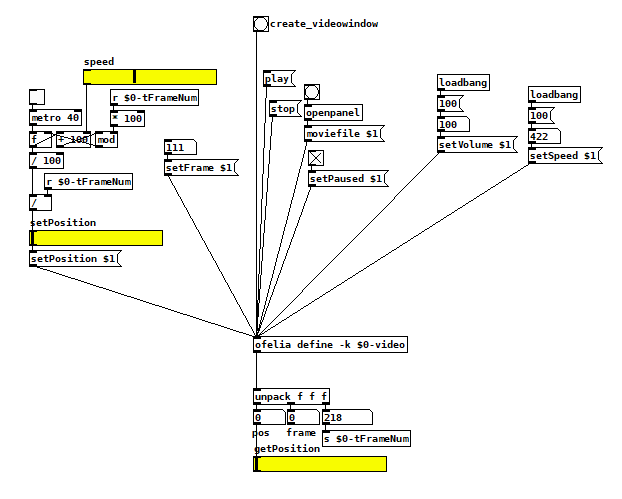
if type(window) ~= "userdata" then;
window = ofWindow();
end;
;
local canvas = pdCanvas(this);
local clock = pdClock(this, "setup");
local videoPlayer = ofVideoPlayer();
;
function ofelia.bang();
ofWindow.addListener("setup", this);
ofWindow.addListener("update", this);
ofWindow.addListener("draw", this);
ofWindow.addListener("exit", this);
window:setPosition(50, 100);
window:setSize(800 + 40, 600 + 40);
if type(window) ~= "userdata" then;
window = ofWindow();
end;
;
window:create();
if ofWindow.exists then;
clock:delay(0);
end;
end;
;
function ofelia.free();
window:destroy();
ofWindow.removeListener("setup", this);
ofWindow.removeListener("update", this);
ofWindow.removeListener("draw", this);
ofWindow.removeListener("exit", this);
end;
;
function ofelia.setup();
ofSetWindowTitle("Video Player");
ofBackground(0, 0, 0, 255);
end;
;
function ofelia.moviefile(path);
videoPlayer:load(path);
videoPlayer:setLoopState(OF_LOOP_NORMAL);
videoPlayer:setPaused(true);
end;
;
function ofelia.setSpeed(f);
videoPlayer:setSpeed(f / 100);
end;
;
function ofelia.play();
videoPlayer:play();
end;
;
function ofelia.stop();
videoPlayer:setFrame(0);
videoPlayer:setPaused(true);
end;
;
function ofelia.setPaused(f);
if f == 1 then pause = true;
else pause = false;
end;
videoPlayer:setPaused(pause);
end;
;
function ofelia.setFrame(f);
videoPlayer:setFrame(f);
end;
;
function ofelia.setPosition(f);
videoPlayer:setPosition(f);
end;
;
function ofelia.setVolume(f);
videoPlayer:setVolume(f / 100);
end;
;
function ofelia.update();
videoPlayer:update();
end;
;
function ofelia.draw();
ofSetHexColor(0xFFFFFF);
videoPlayer:draw(20, 20, 800, 600);
local outputList = {};
outputList[1] = videoPlayer:getPosition();
outputList[2] = videoPlayer:getCurrentFrame();
outputList[3] = videoPlayer:getTotalNumFrames();
return outputList;
end;
;
function ofelia.exit();
videoPlayer:close();
end;
Web Audio Conference 2019 - 2nd Call for Submissions & Keynotes
Apologies for cross-postings
Fifth Annual Web Audio Conference - 2nd Call for Submissions
The fifth Web Audio Conference (WAC) will be held 4-6 December, 2019 at the Norwegian University of Science and Technology (NTNU) in Trondheim, Norway. WAC is an international conference dedicated to web audio technologies and applications. The conference addresses academic research, artistic research, development, design, evaluation and standards concerned with emerging audio-related web technologies such as Web Audio API, Web RTC, WebSockets and Javascript. The conference welcomes web developers, music technologists, computer musicians, application designers, industry engineers, R&D scientists, academic researchers, artists, students and people interested in the fields of web development, music technology, computer music, audio applications and web standards. The previous Web Audio Conferences were held in 2015 at IRCAM and Mozilla in Paris, in 2016 at Georgia Tech in Atlanta, in 2017 at the Centre for Digital Music, Queen Mary University of London in London, and in 2018 at TU Berlin in Berlin.
The internet has become much more than a simple storage and delivery network for audio files, as modern web browsers on desktop and mobile devices bring new user experiences and interaction opportunities. New and emerging web technologies and standards now allow applications to create and manipulate sound in real-time at near-native speeds, enabling the creation of a new generation of web-based applications that mimic the capabilities of desktop software while leveraging unique opportunities afforded by the web in areas such as social collaboration, user experience, cloud computing, and portability. The Web Audio Conference focuses on innovative work by artists, researchers, students, and engineers in industry and academia, highlighting new standards, tools, APIs, and practices as well as innovative web audio applications for musical performance, education, research, collaboration, and production, with an emphasis on bringing more diversity into audio.
Keynote Speakers
We are pleased to announce our two keynote speakers: Rebekah Wilson (independent researcher, technologist, composer, co-founder and technology director for Chicago’s Source Elements) and Norbert Schnell (professor of Music Design at the Digital Media Faculty at the Furtwangen University).
More info available at: https://www.ntnu.edu/wac2019/keynotes
Theme and Topics
The theme for the fifth edition of the Web Audio Conference is Diversity in Web Audio. We particularly encourage submissions focusing on inclusive computing, cultural computing, postcolonial computing, and collaborative and participatory interfaces across the web in the context of generation, production, distribution, consumption and delivery of audio material that especially promote diversity and inclusion.
Further areas of interest include:
- Web Audio API, Web MIDI, Web RTC and other existing or emerging web standards for audio and music.
- Development tools, practices, and strategies of web audio applications.
- Innovative audio-based web applications.
- Web-based music composition, production, delivery, and experience.
- Client-side audio engines and audio processing/rendering (real-time or non real-time).
- Cloud/HPC for music production and live performances.
- Audio data and metadata formats and network delivery.
- Server-side audio processing and client access.
- Frameworks for audio synthesis, processing, and transformation.
- Web-based audio visualization and/or sonification.
- Multimedia integration.
- Web-based live coding and collaborative environments for audio and music generation.
- Web standards and use of standards within audio-based web projects.
- Hardware and tangible interfaces and human-computer interaction in web applications.
- Codecs and standards for remote audio transmission.
- Any other innovative work related to web audio that does not fall into the above categories.
Submission Tracks
We welcome submissions in the following tracks: papers, talks, posters, demos, performances, and artworks. All submissions will be single-blind peer reviewed. The conference proceedings, which will include both papers (for papers and posters) and extended abstracts (for talks, demos, performances, and artworks), will be published open-access online with Creative Commons attribution, and with an ISSN number. A selection of the best papers, as determined by a specialized jury, will be offered the opportunity to publish an extended version at the Journal of Audio Engineering Society.
Papers: Submit a 4-6 page paper to be given as an oral presentation.
Talks: Submit a 1-2 page extended abstract to be given as an oral presentation.
Posters: Submit a 2-4 page paper to be presented at a poster session.
Demos: Submit a work to be presented at a hands-on demo session. Demo submissions should consist of a 1-2 page extended abstract including diagrams or images, and a complete list of technical requirements (including anything expected to be provided by the conference organizers).
Performances: Submit a performance making creative use of web-based audio applications. Performances can include elements such as audience device participation and collaboration, web-based interfaces, Web MIDI, WebSockets, and/or other imaginative approaches to web technology. Submissions must include a title, a 1-2 page description of the performance, links to audio/video/image documentation of the work, a complete list of technical requirements (including anything expected to be provided by conference organizers), and names and one-paragraph biographies of all performers.
Artworks: Submit a sonic web artwork or interactive application which makes significant use of web audio standards such as Web Audio API or Web MIDI in conjunction with other technologies such as HTML5 graphics, WebGL, and Virtual Reality frameworks. Works must be suitable for presentation on a computer kiosk with headphones. They will be featured at the conference venue throughout the conference and on the conference web site. Submissions must include a title, 1-2 page description of the work, a link to access the work, and names and one-paragraph biographies of the authors.
Tutorials: If you are interested in running a tutorial session at the conference, please contact the organizers directly.
Important Dates
March 26, 2019: Open call for submissions starts.
June 16, 2019: Submissions deadline.
September 2, 2019: Notification of acceptances and rejections.
September 15, 2019: Early-bird registration deadline.
October 6, 2019: Camera ready submission and presenter registration deadline.
December 4-6, 2019: The conference.
At least one author of each accepted submission must register for and attend the conference in order to present their work. A limited number of diversity tickets will be available.
Templates and Submission System
Templates and information about the submission system are available on the official conference website: https://www.ntnu.edu/wac2019
Best wishes,
The WAC 2019 Committee
pd extended asio drivers missing
Still using pd extended 0.43 here on windows 10 in combination with and rme fireface using the asio drivers. However, since a couple of days the asio drivers (in pd) went missing. When opening the audio settings, normally in the input/output devices I can select the rme asio, but now it's just 2 empty dropdown-buttons.
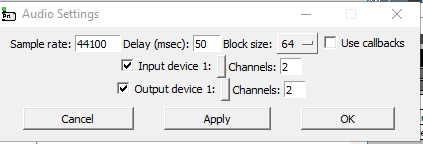
Anyone any idea where pd looks to fill up these lists and how I could get my rme asio drivers back?
Regards,
Domien
Audio Settings for multichannel with MOTU 828 mk3
@matthieu1978 Hello......... too late!
@moscardo...........
I use the same device. You will need ASIO. I do not remember why, but I ended up using Asio4All as the driver. I think I had some problems with the Motu drivers but.........?
Asio4All lets you make the Windows equivalent of an "Aggregate Device"...... so as many sound cards as you can connect....... !...
Asio4All ..... http://tippach.business.t-online.de/asio4all/
Before you start open the Motu Audio settings and set the samplerate, 64 samples per buffer, Internal master clock, tick "Use stereo pairs for windows audio".
In the second window make sure everything is ticked that you might want to use.
Select ASIO in Pd.
Select Asio4All in the Audio settings window.
Tick to use the ins and the outs......

When you have selected Asio4All in Pd then set......
the samplerate you want (must match the setting in the MOTU Audio Console settings
Delay (msec) 2 or 3 should work.
Blocksize 64
Tick the "callback" box
Set 32 in channels (set more if you want to use the built in computer soundcard at the same time)
Set 30 out channels (if more channels... as above)
You can now look at the Asio4All setup. A little green arrow icon should have appeared in the bottom right of windows.
Open it, click the "Spanner" and set like this for all the analog channels.
Highlight (click) the boxes at the left side for digital ins and outs and the inserts and reverb returns if you want to use them them.
Even if the inputs (or outputs) are not in the correct order, they will stay the same, even after re-plugging the soundcard, rebooting the computer, and re-starting Pd.
